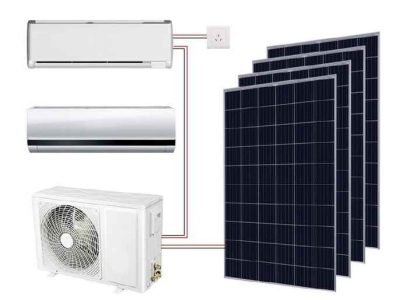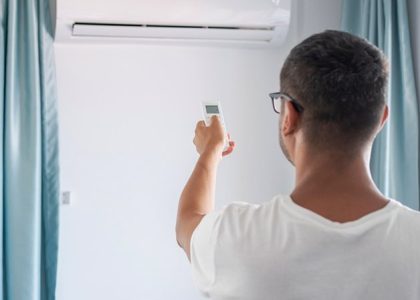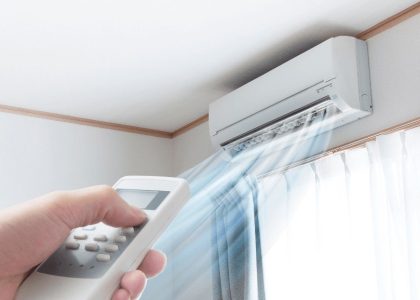 Introduction:
Introduction:
Discovering that your air conditioner is frozen can be puzzling and inconvenient, especially when you’re trying to escape the heat and humidity. An air conditioner freeze-up is a common issue that can result from various factors, ranging from simple maintenance issues to more complex mechanical problems. In this comprehensive guide, we will explore the common causes of an air conditioner freezing up and provide practical solutions and preventive measures to resolve the issue and ensure your cooling system functions efficiently.
 Inadequate Airflow
Inadequate Airflow
Dirty Filter:
A dirty or clogged air filter restricts airflow, causing the evaporator coil to become excessively cold, leading to freezing.
Regularly clean or replace your air filters to ensure proper airflow.
Blocked Air Vents:
Blocked air vents prevent proper airflow and circulation in the system, resulting in freezing.
Ensure that furniture, drapes, or any other obstructions are not blocking the air vents.
Closed or Restrictive Dampers:
Closed or partially closed dampers restrict the flow of return air, leading to inadequate airflow and potential freezing.
Verify that the dampers are open and free from any obstructions.
 Refrigerant Issues
Refrigerant Issues
Low Refrigerant Levels:
Low refrigerant levels due to leaks or insufficient charging can cause a drop in pressure, resulting in the formation of ice on the evaporator coil.
If you suspect a refrigerant leak or inadequate levels, contact a professional technician to inspect and repair the system.
Refrigerant Overcharge:
An excessive amount of refrigerant in the system can also cause the evaporator coil to become too cold and freeze up.
Only trained professionals should handle refrigerant charging and ensure that it is within the manufacturer’s specified guidelines.
 Issues with the Evaporator Coil
Issues with the Evaporator Coil
Dirty or Blocked Evaporator Coil:
Dust, dirt, or debris accumulated on the evaporator coil hampers heat transfer, making the coil excessively cold and prone to freezing.
Regularly clean the evaporator coil to prevent freezing and improve system efficiency.
Frozen Condensate Drain Line:
A frozen or clogged condensate drain line can block proper drainage, causing excess moisture to accumulate and freeze on the coil.
Ensure that the drain line is free from blockages and that it has proper insulation to prevent freezing.
Malfunctioning Components or Mechanical Issues
Faulty Blower Motor:
A malfunctioning blower motor can result in inadequate airflow over the evaporator coil, causing freezing.
Consult a professional technician to diagnose and repair any issues with the blower motor.
Defective Thermostat:
A faulty thermostat may not accurately control the cooling cycle, leading to an extended cooling operation and potential freezing.
Have a professional technician inspect and replace the thermostat if necessary.
Issues with the Expansion Valve:
A malfunctioning expansion valve can cause refrigerant flow issues, resulting in an imbalance of pressure and temperature, leading to freezing.
Consult a professional technician for proper diagnosis and repair of expansion valve-related problems.
Preventive Measures and Maintenance
Regular Maintenance:
Schedule regular maintenance with a professional technician to ensure optimal system performance and address potential issues before they cause freezing.
Air Duct Inspection:
Conduct regular inspections of your air ducts to ensure they are clean, sealed, and free from blockages.
Properly insulated and sealed ductwork helps maintain airflow and prevent freezing.
Professional Inspections and Tune-ups:
Engage a professional technician to inspect your air conditioning system annually, ensuring that all components are functioning correctly and efficiently.
Here are some steps to clean an air conditioner:
Cleaning an air conditioner is an important maintenance task that helps ensure its efficiency, longevity, and optimal performance. Here are some steps to clean an air conditioner:
Turn off the Power:
Before cleaning the air conditioner, make sure to turn off the power supply at the circuit breaker or disconnect the unit from the power source.
Clean the Exterior:
Use a soft cloth or sponge dampened with water and mild soap to clean the outer casing of the air conditioner. Avoid using abrasive cleaners or chemicals that can damage the finish. Wipe away any dirt, dust, or grime from the surface. Dry it thoroughly with a clean cloth.
Clean the Air Filters:
Remove the air filters from the front or side of the air conditioner. Rinse the filters under running water or soak them in a solution of warm water and mild detergent. Gently scrub the filters to remove dirt and debris. Rinse thoroughly and allow the filters to dry completely before reinstalling them.
Clean the Coil Fins:
Using a soft brush or a fin cleaning tool, gently clean the coil fins located behind the air filters. Brush in the direction of the fins to avoid bending them. This removes any dust or debris that may have accumulated, improving airflow.
Clean the Drainage Hole:
Check for a drainage hole or tube located at the back or bottom of the air conditioner. Use a small brush or a pipe cleaner to remove any clogs or debris that may be blocking the flow of water.
Remove Debris from the Condenser Unit:
If the air conditioner has an outdoor condenser unit, inspect it for any debris, such as leaves, grass, or dirt. Use a brush or vacuum cleaner to remove any accumulated debris from the unit. Ensure proper airflow around the condenser unit.
Schedule Professional Maintenance:
While regular cleaning is important, it is also recommended to schedule professional maintenance at least once a year. A qualified technician can perform a thorough inspection, clean internal components, and address any potential issues that may require professional expertise.
Remember to consult the manufacturer’s guidelines or the user manual for specific cleaning instructions and recommended cleaning products. Regular cleaning and maintenance routine will help keep the air conditioner running efficiently and prolong its lifespan.
 Conclusion:
Conclusion:
Understanding the common causes of air conditioner freezing and implementing proper solutions and preventive measures is essential for maintaining a reliable and efficient cooling system. Adequate airflow, sufficient refrigerant levels, and a clean evaporator coil are key factors in preventing freezing. Regular maintenance and inspections by professional technicians help ensure the system operates optimally. By following the guidelines in this comprehensive guide, you can overcome freezing issues, maximize your air conditioner’s performance, and enjoy cool and comfortable indoor temperatures, even during the hottest months of the year.




